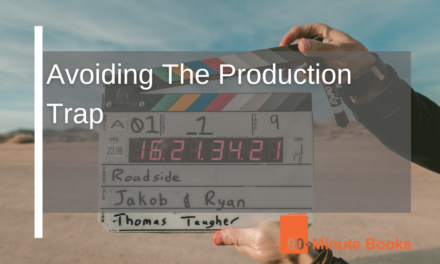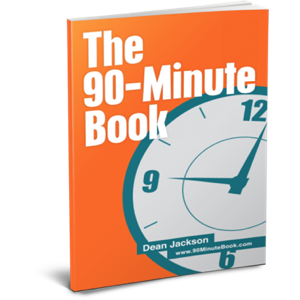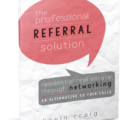I don’t think that writer’s block exists. I believe it’s too easy to create a shrine to it instead. People who say they have writer’s block are just looking for an excuse not to write. They’re waiting for inspiration to strike instead of taking responsibility for their work.
There are many ways to overcome moments when you feel like you can’t write. I’ve led hundreds of “word sprints” during National Novel Writing Month, and I’ve never seen anyone unable to write. Most people can write at least 100 words in a simple five-minute sprint. When people ask how to beat writer’s block, my advice is to start writing.
What Is Writer’s Block?
If you’ve ever felt like you can’t think of anything to write or don’t know how to continue your writing project, you’ve experienced writer’s block.
Writer’s block can happen to any writer, no matter what genre they are writing in, whether it be fiction, poetry, a blog post, or an article. It is common for writers working on their first novel to experience writer’s block, but it can also occur in more experienced writers.
Everyone who enjoys creative writing will go through a phase where they feel blocked and unable to write.
The author feels like they are being blocked from their own ideas.
Not being able to write does not mean you are bad at it; it could just mean that you need to take a step back and look at your work from a different perspective.
While writer’s block doesn’t necessarily mean you’re uninterested in your work, it can throw a wrench in your plans if you don’t know how to overcome it.

FREE BOOK
Discover the 5 Compelling Book Titles Types that create an ‘I Want That…’ response.
Causes Of Writer’s Block
There are a few things that may be causing your writer’s block the next time you run into it.
Negative Thoughts
Self-criticism and self-doubt are common among writers. John Steinbeck even said he felt ignorant and unable when writing The Grapes of Wrath, which went on to win a Pulitzer Prize.
Even if you’re not confident in your writing, it’s normal to feel like your work may not be exciting or appealing to others. You may worry that people won’t want to read what you’ve written or that you’re not knowledgeable enough about your topic to consider yourself an expert. Though these doubts can seize your self-confidence and creativity, trying to push through them is essential.
Being too critical of yourself can prevent you from getting started on a writing project and giving up on it completely.
Competing Responsibilities
Many people passionate about writing pursue it while managing other responsibilities, such as family and work obligations.
If you find yourself pushing your art to the back burner, it may be challenging to get motivated when you finally have some free time.
You may feel guilty for writing your story, poem, or article instead of spending time with your family or caring for something that needs to be done around the house.
Getting Off The Path In Your Writing Process
If you get sidetracked from your original writing project, it may be because you’ve added new characters or strayed from your outline.
Boredom
You can get bored with your writing if you spend too much time worrying about it.
This can make you lose your creativity and feel bored because you’re looking at the small details of your work, and you need to take a step back and see the bigger picture again.
Perfectionism
Experienced writers and creatives know that the “perfect” end product does not usually come from the first try. It usually takes several tries to get something that they are satisfied with. They start at the beginning, create, and then go back over their work to tweak words and ideas until it is the way that they want it to be.
This way of thinking can prevent you from writing down the great ideas in your head simply because you think they’re not perfect. This isn’t true, and your ideas are worth writing down no matter what.
Lack Of Ideas
You may feel inspired to write but unsure of what to write about.
You may be unable to come up with ideas because your mind is distracted. You may need prompts or other inspiration to come up with ideas. Alternatively, you may have plenty of ideas, but you are dismissing them too quickly instead of mulling over each of them to see where they could take you.
Exhaustion
If your body is tired, your mind will struggle to function correctly. Things like not getting enough sleep, working too hard, not having a good diet, and not being active can all stop you from being creative and getting work done.
summon up the same level of energy day after day, especially when other things on your to-do list are vying for your attention. Being creative isn’t something anyone can assign to us, but being human means being a creator. So you should prioritize creativity and not allow writer’s block to become an excuse. If you’ve resolved to write the book you feel called to write, here are some tips to help you stay creative and focused.
Employ Word Sprints
A sprint is a high-speed writing exercise that allows you to bypass your judgmental thoughts and tap into your intuition. As the clock ticks, it’s important to keep writing without hesitation. Let your thoughts flow freely and illuminate every stray thought in your mind. Drench your page with ink.
The more ideas you have, the better for any creative endeavor. No matter how good or bad, every idea paves the way for the next. Creativity is all about making connections – putting unlikely things together and forming original associations of ideas. Such breakthroughs come from an enlightened trial and error approach, getting more ideas just to get more ideas. You can do word sprints with a group during NaNoWriMo every November or join in a local write-in. You can also do them on your own.
Try the List-Making Method
I often explore the beginning of a story by using Ray Bradbury’s list-making method. Bradbury first became a writer by making long lists of nouns to trigger ideas. He said that each person has a wealth of experiences in their mind, and you just have to find a way to bring all these things to the surface and recognize patterns. Bradbury did this by making lists of nouns. “Conjure the nouns, alert the secret self, taste the darkness…speak softly, and write any old word that wants to jump out of your nerves onto the page,” he said.
Bradbury created a list of words and then wrote short paragraphs about each word to help him better understand them. He asked himself why he chose that word and what it meant.
For example, here’s the list of nouns that sparked one of Bradbury’s more notable books:
The lake, the night, the crickets, the ravine, the attic, the basement, the trapdoor, the baby, the crowd, the night train, the fog horn, the scythe, the carnival, the carousel, the dwarf, the mirror maze, the skeleton.
Bradbury found that the list of words he had created had a pattern that related to his love and fear of circuses and carnivals. He remembered his first ride on a merry-go-round and how the world seemed to be spinning.
He thought about the characters associated with the words and how they related to his life. In the end, he returned to the carousel from his youth which had terrified him. The story wasn’t a memoir but based on his life and the things he had experienced.
I like doing this exercise because it forces you to think outside the box. It’s a personal reflection, a way to open those tightly shut doors of your mind and follow the surprising feather of a memory.
You can use writing exercises to improve your novel-writing skills in various ways. For example, you can use them to develop new story ideas, warm up before writing, or break out of a creative rut.
The best thing about writing prompts is that they can help you feel less pressure to write perfect prose and encourage you to experiment with new ideas. Exercises can also teach you that much writing happens spontaneously, without planning everything in advance. So go ahead and let your ideas flow freely!
Believe in Yourself
Writer’s block can occur when a writer thinks they don’t have anything important enough to say or don’t believe they have the right high-level literary words to tell their story. Another reason for writer’s block might be the fear that the world will hate their work. It’s a natural fear, especially since people usually don’t respond warmly when they find out someone is a writer. People might ask if they’re published, or worse, they might say, “Oh.”
Agatha Christie said that even after writing ten books, she didn’t consider herself a “real author.” You earn your stripes each time you pick up a pen and write your story. You’re a writer because you write. There’s no other definition.
Trust the urge that compels you to write. Convince yourself that you are a writer. Let others know that you are a writer. And never question it.
Don’t Wait for Inspiration
Inspiration can be a powerful force. It can carry an author forward like a rushing river when it hits. But if you wait for it, nothing will happen.
Instead of the muse being invoked to sing stories into authors’ ears, the muse is created through storytelling.
Toni Morrison stated that you are forced to write or are not a true writer. She would not be considered a writer if she had waited for inspiration.
There is no real writer’s block; you just have to motivate yourself. The blank page is just a chance to let all your dramatic, ornery, lyrical, and shocking thoughts out. The words you write every day can be inspiring to you and to others. Each word leads to more words and more ideas.
Develop a Routine
It’s good to establish a writing routine because it’s a plan of commitment. A routine helps get rid of obstacles that are preventing you from writing.
When you write simultaneously each day and in the same place, you reap the benefits of a better imagination and concentration. This is because routines help trigger cognitive cues associated with your story, peace of mind, and less stress.
If you dedicate a specific time and place to writing, you are more likely to be successful in your storytelling. When you work regularly, inspiration will also come more often.
Guest Post Disclaimer
The views expressed in this post do not represent the views of 90-Minute Books. The information has not been verified and should be considered opinion. You are always advised to do independent research.











